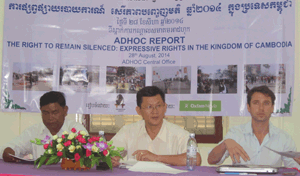The right to remain silent
When he testified two weeks ago, Mam Nai, one of the lead interrogators at S-21, denied any knowledge of tortures at S-21, contradicting the testimony of many civil party victims, as well as that of Duch himself. He also refused to answer several questions about his duties and actions at S-21. At the end of Mam Nai’s testimony, Duch even stood up and commanded him to tell the truth. Everyone seems to know that Mam Nai is not telling the truth, so why doesn’t he admit what actually happened? Can he be forced to confess?
The answer to these questions deals with international criminal law, which the ECCC is following. Under international standards for criminal law cases, those who testify in court have the right to remain silent rather than incriminating themselves. This right is an embedded norm in international customary law and protects the rights and freedoms of every person. If a witness, in order to answer a question in court, would have to admit that they did something illegal, they do not have to respond to the question. The judges reminded Mam Nai that he is allowed to remain silent and seek legal assistance before the commencement of his testimony.
Under Article 55 of the Rome Statute of the International Criminal Court, a person “shall not be compelled to incriminate himself or herself to confess guilt.” The Article further states that when a person is believed to have committed a crime and they are going to be questioned by the Prosecutors, they must also be informed of their right “to remain silent, without such silence being a consideration in the determination of guilt or innocence”. Why do witnesses have this right to be silent about their own crimes?
The right to remain silent is an important principle of just legal proceedings and is one of the major distinctions between courtroom questioning from forced interrogations. Another major difference is the presumption of innocence. According to Article 11 of the Universal Declaration of Human Rights, suspects are innocent until proven guilty. Guilt is determined based upon evidence, including documents, photographs, and witness testimony. However, it is not the role of the accused to prove their own guilt – that duty belongs to the prosecutors. The witnesses themselves are not even on trial, so the court is not concerned with their guilt or innocence. Allowing witnesses to remain silent also means that prosecutors cannot force them to provide answers that they do not want to give. When some questions are asked, the only way to answer them may be to either incriminate oneself, or to lie. The right to remain silent avoids both of these risks. Since witnesses have no control over the questions that they are asked, they are given the right to refuse to answer questions, in order to preserve their freedom, so that they are not forced into making statements that they do not want to make.
The right to remain silent also provides an incentive to the prosecution to gather as much hard evidence and documentation of crimes as possible so that the weight of their case does not rely solely upon coercing confessions of guilt.

